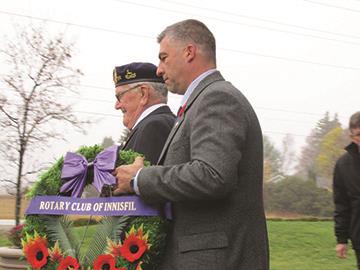Remembering our Fallen Heros

Remembrance Day (sometimes known as Poppy Day) is a day observed every November 11th since the end of the First World War, to recall the end of fighting on November 11th, 1918. It is to remember all those in the armed forces who have died in the line of duty during and since. In 1919 King George V inaugurated the tradition in 1919. Hostilities formally ended "at the 11th hour of the 11th day of the 11th month", in accordance with the armistice signed by representatives of Germany and the Entente between 5:12 and 5:20 that morning. ("At the 11th hour" refers to the passing of the 11th hour, or 11:00 am.) The First World War officially ended with the signing of the Treaty of Versailles on 28 June 1919.
The red remembrance poppy has become a familiar emblem of Remembrance Day due to the poem "In Flanders Fields" written by Canadian physician Lieutenant-Colonel John McCrae. After reading the poem, Moina Michael, a professor at the University of Georgia, wrote the poem, "We Shall Remember," and swore to wear a red poppy on the anniversary. The custom spread to Europe and the countries of the British Empire and Commonwealth within three years. Poppies were worn for the first time at the 1921 anniversary ceremony. At first real poppies were worn. These poppies bloomed across some of the worst battlefields of Flanders in World War I; their brilliant red colour became a symbol for the blood spilled in the war.
With all of this in mind, the Town of Innisfil hosted a Remembrance Day tradition of the laying of wreaths at the Innisfil Cenotaph. The Rotary Club of Innisfil was honoured to join in the ceremonies with President Doug Weber laying a wreath in remembrance. Also at our Club meeting we held a reading of the poem "In Flanders Fields" and its historical background presented by Rotarian Grace Doiron. Lest we forget.